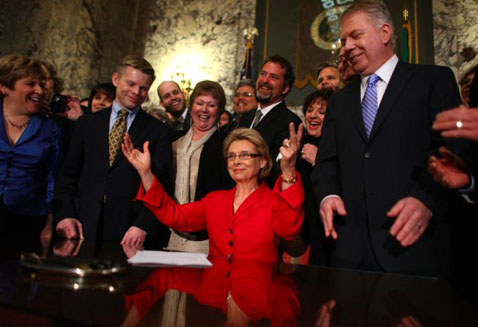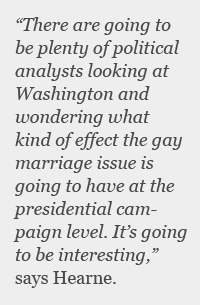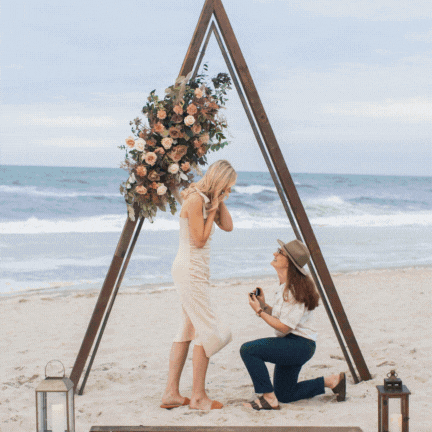Winning in Washington
Washington state’s legislative journey to recognize same-sex marriage
By Deanna Duff

On Feb. 13, after a long journey of lobbying and debate, Washington state’s Gov. Christine Gregoire signed legislation legally recognizing same-sex marriage. It seemed particularly fitting that such a heartening event occurred just one day before Valentine’s Day.
“It’s all very exciting. What a cool Valentine’s Day present for Washington gays and lesbians,” says Heather Purser, who successfully campaigned for the Suquamish Tribe in Washington, of which she’s a member, to recognize same-sex marriage.
Washington is ahead of the curve nationally since it is the seventh state to legally recognize same-sex marriage. While the end result is a huge stride forward, the process itself was a series of steps spanning decades.
“In Washington, there has been a long conversation with voters about these issues,” says Zach Silk, campaign manager for Washington United for Marriage, a coalition group that campaigned for marriage equality. “It started in the legislature with specific bills about civil rights, then domestic partnership bills and eventually marriage equality. That long conversation set Washington in a unique place compared to other states.”
Gov. Gregoire acknowledges that her personal opinions evolved thanks to the prolonged discussions. While originally hesitant, she now fully embraces the idea of marriage equality.
“This has been a very emotional and personal journey for the governor. Her daughters had great influence on her as they have referred to this issue as ‘the civil rights movement’ of this generation’s time,” says Cory Curtis, spokesperson for Gov. Gregoire.
For other states and lawmakers still mired in dissension, Washington’s journey provides hope since its discussions did not start on a positive note, either. In 1998, Washington legislature passed a Defense of Marriage Act (DOMA) defining matrimony as one man to one woman. The state Supreme Court upheld the law in 2005.
The first major victory for LGBT rights occurred in 2006 when Gov. Gregoire signed a law banning discrimination based on sexual orientation, which had taken 29 years for the legislature to pass. In 2007, the first of three laws was passed establishing domestic partnership rights. By 2009, all the state-level rights and protections of marriage were conferred to domestic partnerships.
Later that year, a referendum asked voters to overturn domestic partnerships. In a historic victory, Washington became the first state to vote in favor of equality. The domestic partnership law remained intact.
“It was the first time any state had upheld rights like that at the ballot box. In many ways, I think that led to many of the current efforts,” says Rod Hearne, executive director for Equal Rights Washington.
Advocates, however, continued pushing for the recognition of same-sex marriage. “On the one hand, it was great to get those (domestic partnership) rights and benefits, but particularly in law, words matter. To literally create a separate but equal status for gay and lesbian people delineated the fact that we weren’t equal. Even if it’s 99.9 percent, that’s still not equal,” says Hearne.
In fact, delineating unions as “domestic partnerships” instead of “marriages” meant that gay couples still did not qualify for over 1,100 federal benefits. Many such benefits impacted children of gay couples, such as being denied federal Social Security survivor benefits.
Washington United for Marriage launched a full campaign lobbying for the recognition of same-sex marriage. The strategy focused on personal testimonials.
“Stories are the most powerful thing we have. It wasn’t about any one killer advertisement or radio piece,” says Hearne. “Stories were our most effective tool and that obviously moved a lot of hearts and minds.”
 Couples in relationships, who had sometimes been engaged for decades, testified along with their children, families and communities. The approach clearly impacted lawmakers who also began speaking from the heart rather than regurgitating rhetoric. Washington state 16th District Rep. Maureen Walsh, a Republican and Catholic, struck a chord with colleagues and the nation after video of her personal, and often humorous testimony, went viral.
Couples in relationships, who had sometimes been engaged for decades, testified along with their children, families and communities. The approach clearly impacted lawmakers who also began speaking from the heart rather than regurgitating rhetoric. Washington state 16th District Rep. Maureen Walsh, a Republican and Catholic, struck a chord with colleagues and the nation after video of her personal, and often humorous testimony, went viral.
“My daughter came out of the closet a couple of years ago and I thought I was going to agonize about that. Nothing is different. She is still a fabulous human being; and she’s met a person she loves very much and someday, by God, I want to throw a wedding for that kid, and I hope that’s exactly what I can do. I hope that she will not feel like a second-class citizen involved in something called a ‘domestic partnership,’ which frankly sounds like a Merry Maids franchise to me,” said Walsh.
Walsh’s endorsement highlighted how marriage equality can garner bipartisan support. “Clearly, the national Republican party decided to run to the extreme right on this issue, but we’ve been lucky in Washington to have support from very high-profile Republicans,” says Silk. “It shows that this actually is a mainstream issue with bipartisan support.”
The state Senate voted 28-21 in favor of the bill, SB 6239, on Feb. 1. The House of Representatives approved its version on Feb. 8 with a vote of 55-43, and Gov. Gregoire signed the bill into law on Feb. 13.
Republican presidential candidate Rick Santorum made a campaign stop in Washington to coincide with the Feb. 13 signing. The former Pennsylvania senator has been a longtime, vocal and vitriolic opponent of marriage equality. He met and rallied with like-minded Washington equal-rights opponents.
“There are going to be plenty of political analysts looking at Washington and wondering what kind of effect the gay marriage issue is going to have at the presidential campaign level. It’s going to be interesting,” says Hearne.
While Santorum’s visit signaled that Washington could be the next battleground between conservatives and liberals regarding same-sex marriage, local leaders hope otherwise.
“Some may question if I am truly a Republican (for having supported same-sex marriage). I would submit that a core tenet of the Republican Party is individual freedom,” said Walsh in a written statement to Equally Wed.
The recent Washington legislative process was remarkably civil with opponents choosing not to use procedural roadblocks to stymie legislation and the overall tenor remained respectful.
“The general discourse was not nearly as heated and divisive as it was in years past. During the civil rights and anti-discrimination legislations years ago, frankly, awful things were said in the (legislative) chambers,” says Silk. “This time, legislators were very respectful during debates and we hope that carries into how people generally talk about these issues.”
Hearne believes that personalizing the issue helped maintain civil discourse as did establishing a diverse coalition. In addition to expected support from groups such as the ACLU, a broad spectrum of unions, faith leaders and the business community stepped forward. Microsoft, Amazon and Starbucks were among the major corporations who pledged support.
“That had a very large impact and particularly for some legislators who have those corporations in their home districts. It was a real eye opener. I think corporations realize that equality is actually good for business,” says Hearne.
A referendum was filed to repeal the bill the same day Gov. Gregoire signed it into law. Proponents were not surprised and already mobilized to defend the bill.
“It was by no means a slam dunk (to pass the legislation originally) and it still isn’t a slam dunk,” says Hearne. “However, we probably wouldn’t have made a concerted effort to pass the legislation this year if we weren’t confident that we could defend it at the ballot box in Nov. 2012. That said, we’re not resting on our laurels.”
Gov. Gregoire has also vowed to defend the recent legislation. “The governor has said she will work to defeat (the referendum). … The governor is hopeful that the people of Washington see basic equal rights as a part of the state’s fabric,” said Curtis speaking on Gov. Gregoire’s behalf in a written statement to Equally Wed.
While the discussion is far from over, advocates allowed themselves time to celebrate a special Valentine’s Day which was particularly filled with love this year.
“It is really rare in life to feel like you are being written into history as it happens,” says Silk, who attended the bill’s signing ceremony. “Everyone felt it happening and the room exploded with cheer and applause when the governor signed the bill. It was an amazing moment following a lot of hard work.”
Photo: Joshua Trujillo / SeattlePI.com





















